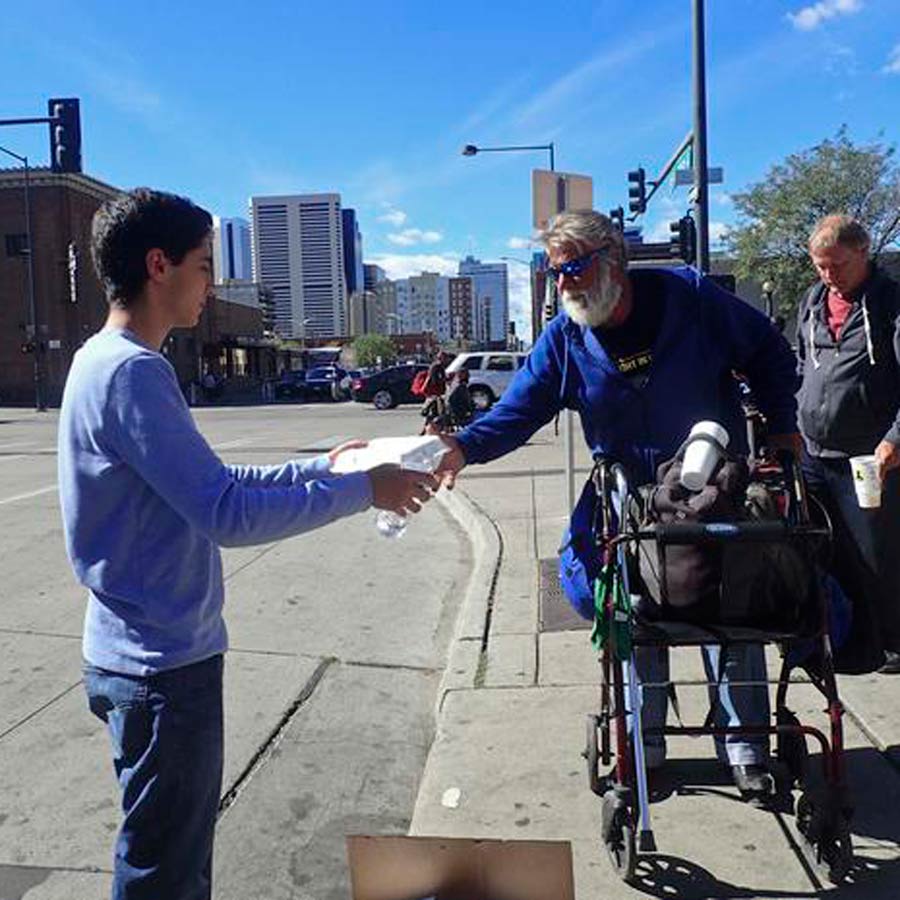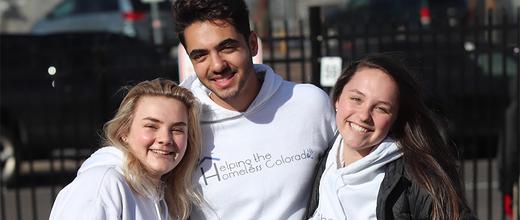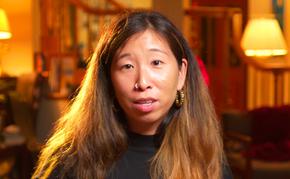The views expressed in our content reflect individual perspectives and do not represent the authoritative views of the Baha'i Faith.
On a chilly, calm spring morning in Denver, my 8th-grade friends and I headed downtown for a service project to feed the homeless. On this day, I met Mary.
Mary and I had a deep conversation as she rested on a piece of cardboard with only a rag below her head.
Our conversation came about as a result of my faith in the Baha’i teachings and their emphasis on serving others, and because of this powerful admonition from Baha’u’llah: “Man’s merit lieth in service and virtue and not in the pageantry of wealth and riches.” – Tablets of Baha’u’llah, p. 138. My friends and I had recently formed a non-profit organization called Helping the Homeless Colorado, and we were trying to do our best to reach out to homeless people.
I vividly remember approaching Mary with two turkey and cheese sandwiches in my hand. As I introduced myself, she stood up and smiled at me. I asked if I could have lunch with her. She gladly accepted. I sat down on the pavement next to her, but she immediately pulled out a towel from her bag and offered it for me to sit on instead.
 As we both enjoyed our meal, I then pulled out the list of questions I planned to ask individuals I met that day. She joyfully answered all of my questions. Having only known her for twenty minutes, I felt so welcomed by her. I’ll always remember Mary’s kind and pleasant attitude — but as we engaged in conversation, I realized something very unique. I had entered this encounter with the preconceived notion that because she was homeless we would not be able to hold a genuine conversation. I was very wrong.
As we both enjoyed our meal, I then pulled out the list of questions I planned to ask individuals I met that day. She joyfully answered all of my questions. Having only known her for twenty minutes, I felt so welcomed by her. I’ll always remember Mary’s kind and pleasant attitude — but as we engaged in conversation, I realized something very unique. I had entered this encounter with the preconceived notion that because she was homeless we would not be able to hold a genuine conversation. I was very wrong.
RELATED: The Root Cause of Homelessness
I asked Mary two questions. Her answers forever changed the way I viewed homeless people — first, I wanted to know, how did you become homeless? Second, I asked, what do you wish the world would know about you?
When I asked her the first question she paused and looked at my curious face. Then with a sense of shame, she shared with me that she has been homeless her entire life. I recall the chills that rolled down my back. Mary told me that her mother had been fleeing domestic violence when she was born. Coming from an abusive father, her mother tried to take young Mary to a better place. But, through thick and thin, her mother could never provide a home, or a good life, for her daughter.
Mary told me that with her mother constantly moving and trying to find new places for them to live, she wasn’t able to attend school as diligently as she would have liked. As the years went by, it became even harder for her to keep up with her studies, and with that lost hope for her future, she dropped out of high school. She began to lose touch with her mother. With tears rolling down her face, she shared that her mother had died from a drug overdose when Mary was only 19 years old. Thirty years later, with a lack of education and resources, she still calls the streets her home.
I was in tears by the end of her explanation. Moving on from our emotions, she answered my second question. “I want the world to know that I am not negligent,” she said.
Mary told me that everyone assumes the worst of her and the homeless community, that we fail as a society to treat individuals experiencing homelessness in the way we should treat them — as people.
We live in a world consumed with responsibilities and expectations, and in light of this, some have become ever so vaccinated against human suffering. The thought of a person standing in the freezing cold, a single mother providing for her children in a park, or a teen relying on their best friends’ couch for shelter doesn’t seem to faze us anymore.
As a society, we claim to have absolute knowledge about the poor. But, in reality, we only have knowledge of the problems that they create, rather than the solutions we can construct.
None of us gets to choose where our lives start. Mary’s life started in a manner she could not choose. I can never comprehend the experiences and journeys she went through as a child, simply because our lives have taken very different paths. I grew up in a supportive family, and she grew up in an abusive one. Therefore, I have no right to claim absolute knowledge about her and her community. I cannot label homeless people or regard them in any matter less than human.
But I do consider it my job to support more people like Mary—because she is a part of my community, therefore, it is my responsibility to look out for her. She is a member of my family—the human family.
RELATED: Harnessing the Power of Youth to Help Homeless Students
All men are of one family; the crown of humanity rests on the head of every human being. The Baha’i Writings say:
In the eyes of the Creator all His children are equal; His goodness is poured forth on all. He does not favour this nation nor that nation, all alike are His creatures. This being so, why should we make divisions, separating one race from another? Why should we create barriers of superstition and tradition bringing discord and hatred among the people?
The only difference between members of the human family is that of degree … Some are like the sick and must be treated with tenderness and care. None are bad or evil! We must not be repelled by these poor children. We must treat them with great kindness…
To me, my friend Mary’s life reflects our society. The hate we give each other destroys us, but, the love we foster in one another builds us. If we want to grow together as a society, we must work together and care for each other. My work with the homeless is not, and should never be, exclusive. It is our duty as humans to care for other humans regardless of where they are in life.
So, I ask anyone reading this article to consider this: the next time you see a homeless person, I challenge you to disregard your preconceived notions. I urge you to take the time to ask about their story and learn about their life — but most importantly, I ask you to listen.

















Comments
Sign in or create an account
Continue with Facebookor